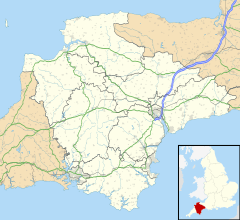Bucks Mills facts for kids
Quick facts for kids Bucks Mills |
|
|---|---|
 The "Gut" blasted from the rocks on Bucks Mills beach. |
|
| OS grid reference | SS357233 |
| Civil parish | |
| District |
|
| Shire county | |
| Region | |
| Country | England |
| Sovereign state | United Kingdom |
| Postcode district | EX35 |
| Police | Devon and Cornwall |
| Fire | Devon and Somerset |
| Ambulance | South Western |
| EU Parliament | South West England |
| UK Parliament |
|
Bucks Mills is a small village in Devon, England. It is located on the north coast, within the area of Woolfardisworthy. The village is known for its beautiful natural surroundings. It is part of the North Devon Coast Area of Outstanding Natural Beauty. The famous South West Coast Path also runs through the village.
Bucks Mills got its name from an old estate called Bucks. This estate was mentioned in the Domesday Book of 1086. Next to the village, you'll find Bucks Woods. This area includes the site of an Iron Age hill fort called Peppercombe Castle.
The village has a stream that once powered at least one mill. This stream flows over the cliff edge, creating a waterfall onto the beach. The beach itself has large pebbles and interesting sandstone formations.
The Gut and Old Harbour
During the time of Queen Elizabeth I (the Elizabethan era), something special was created here. A man named Richard Cole (1568-1614) owned the land. He used gunpowder to blast a gap in the rocks. This gap is now known as "The Gut."
The Gut made it easier to reach a small harbour that Richard Cole built. This harbour was used by fishing boats. Later, in the 1700s and 1800s, it was used to bring in "culm." Culm is a mix of anthracite (a type of coal) and limestone. This mixture was burned in special ovens called kilns to make fertiliser. You can still see the remains of two of these old lime kilns on the beach today.
Village Life and Famous Residents
In the 1700s and 1800s, many people in Bucks Mills were part of the Braund family. One famous resident was Captain James Braund. He lived in King Cottage and was known as the "King of Bucks."
St Anne's Church was built in 1862. A lady named Mrs Elwes helped fund the church. She owned the Walland Cary estate, where the village is located.
Bucks Mill Cabin was home to two artists, Mary Stella Edwards and Judith Ackland. During World War II, many children from London came to Bucks Mills to stay safe. One of these children was the actress Prunella Scales.
History of the Bucks Estate
The name Bucks Mills comes from the old estate of Bucks. This estate was listed in the Domesday Book of 1086. At that time, it was called Bochewis. It was owned by Theobald FitzBerner. Before the Norman Conquest in 1066, three Anglo-Saxon chiefs had owned the land together.
Over time, the Bucks estate became part of the Cole family's land. They were an important family from Devon. One of the most notable Coles was Richard Cole (1568-1614). He was the last Cole to live at Bucks. Richard Cole was the person who built the harbour and blasted "The Gut" in the rocks. He wanted to create a safe place for ships and boats. You can still see parts of this old harbour, sometimes called the Old Quay, when the tide is low.
 | Shirley Ann Jackson |
 | Garett Morgan |
 | J. Ernest Wilkins Jr. |
 | Elijah McCoy |




